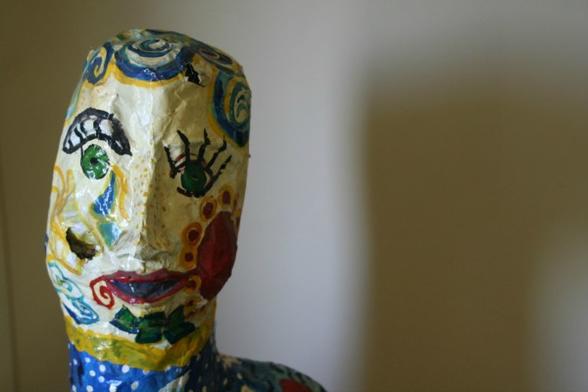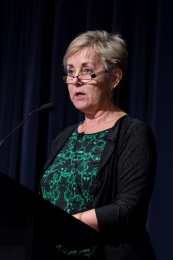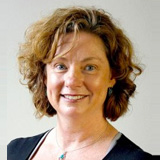artwork-from-isis-the-eating-issues-centre.jpg

Photo taken of an artwork produced by clients of Isis – The Eating Issues Centre
Commissioner's Update
The road to reform
We’re at a significant cross-road after the publishing of the National Review of Mental Health Programs and Services with regard to how Governments allocate their resources so that people with mental health, drug and alcohol problems have lives with purpose, and access to quality services and supports when and where they need them.
While transformational change is often a rocky road, too often we have lost the initiative because it ends up in the too hard basket, gets bogged down in process or simply because another good idea distracts us.
We can’t lose sight of the big picture. We must grasp this opportunity for systemic reform.
I support a national, integrated approach to mental health reform across Australia, with a person-centred focus and more emphasis on community-based support.
To succeed it must be supported by a comprehensive and collaborative reform strategy, implemented over time but with a sense of urgency.
Consistent with the Queensland Mental Health, Drug and Alcohol Strategic Plan 2014-2019, we are moving forward in several areas to improve outcomes in early intervention, promotion and awareness and suicide prevention supported by the development of indicators.
We hope that decisions are made by governments without undue delay to make the most of opportunities for collaborative work, and in the meantime will be taking the recommendations of the National Report into account as we move ahead.
We all need to get on with realising the vision we have for access to quality care and support, focused on wellness and recovery.
You can read the Australian Government’s plans in response to the report here.
Listening to consumers, families, carers
Letters, emails, phone calls
Several important issues have been raised in letters, emails, phone calls and at various forums in the last month.
Locked wards
Locked wards remains a contentious issue in some areas. For voluntary patients, it appears that in some wards they are readily assisted to get in and out, but in others this is much more difficult. There is also a strong argument that it is a violation of human rights to be kept in a locked ward, which is why it is so important for changes to be implemented to allow voluntary patients to move freely.
Where building modifications have not been completed staff have to spend a lot of time letting people in and out which means that visitors can be kept waiting for some time.
It is good to hear that a number of Hospital and Health Services (HHS) are actively trying to make the experience of patients more interesting and the environment more amenable, issues that were raised in our report on Least Restrictive Practices.
Rights of consumers and families
Oversight of consumer rights and the rights of families and carers to be consulted in the treatment of their loved ones has been raised a number of times.
The proposed changes to the Mental Health Act will go some way to addressing this as long as its implementation is accompanied by sufficient resources. However, we need to reconsider whether the proposal to introduce Patient Rights Advisors within each HHS is the right mechanism to give people confidence that their rights will be explained and protected.
ECT
The use of Electroconvulsive Therapy (ECT) and the right for individuals to refuse this treatment is regularly raised. ECT remains a widely debated treatment in Australia and elsewhere but people who have had ECT as well as clinicians advise that it can be very effective for some people. This goes to the broader issue of the right of people to refuse a particular treatment, even when they are being treated under an Involuntary Treatment Order.
Empowering consumers, families and carers
We are continually looking for ways to empower consumers, families and carers to participate in the conversations about reform.
This year we have sponsored an extra two bursaries for people from Queensland to attend the TheMHS conference in Canberra in August, so get those applications in before 19 June 2015. Apply on the TheMHS website.
The Commission is also sponsoring an extra Queenslander to attend the National Suicide Prevention Conference in Hobart in July. We are consulting with Roses in the Ocean to provide a nominee.
New Queensland Mental Health Bill released
The Minister for Health has released the new exposure draft Mental Health Bill 2015, and it appears to include a number of new provisions that are welcome, including:
- improved safeguards for the inappropriate use of medication for sedation
- enhanced consumer rights
- greater involvement from families and carers.
The Commission will review the new Bill to check it adequately protects the rights of individuals and families, and gives appropriate external oversight for people treated under mental health legislation.
Read the New draft Mental Health Bill media release.
QMHDAC advice
The Queensland Mental Health and Drug Advisory Council made strong representations about the Bill at its April meeting, including:
- ensuring that Patient Rights Advisors are independent and are perceived to be independent of Hospital and Health Services
- including a requirement for discharge plans for all patients in mental health wards
- stronger regulation to ensure medication is not used as a form of chemical restraint
- the need to ensure consumers, families and carers are involved in developing the policies and procedures underpinning the Bill’s implementation should be enacted
Read the Council’s April 2015 Communiqué.
Next steps
The Bill is open for consultation until 26 June 2015 and the Commission will make a fresh submission.
Read the Bill and consultation documents.
Queensland Government policy commitments
The Commission has reviewed the new Queensland Government’s policy commitments to identify opportunities to improve mental health and wellbeing. We outlined potential opportunities in an issues paper including:
- proactively catering for people with mental health issues in the additional funding for physical health
- earmarking at least 10% of promised 400 additional nurses for mental health nurses
- ensuring training of nurses includes representative training by consumers
- the proposed statewide adolescent mental health extended treatment and rehabilitation model of care, with consideration of smaller facilities distributed through major regional centres
- the additional 45 high school guidance officers to complement existing programs such as Ed-LinQ that link schools with mental health services
- supporting the opportunity to renew investment in community-based prevention and early intervention education and promotion for mental health as well as physical health
Read the full Government Policy Commitments: Opportunities to improve Mental Health and Wellbeing Issues Paper
Watching the west
The Commission has been watching Western Australia lately with three things of particular interest happening:
- The Parliamentary Inquiry into mental health impacts of FIFO work arrangements which is now due to be tabled on 11 June 2015. Read more here.
- The inquest into suicides of five people who had been in touch with the same mental health service in Perth in 2011 and 2012. Read more here.
- The work of the Western Australian Mental Health Commission in reforming the funding process for mental health services. This is the only MHC in Australia that funds mental health services.
Drug and alcohol
Progress on Drug and Alcohol Action Plan
Preparation of the Commission’s Drug and Alcohol Action Plan is progressing under the guidance of a sector-wide group, with consultation with leading experts scheduled in May.
Their advice will help formulate a draft action plan that will be released for community and sector consultation this year.
The Queensland Mental Health and Drug Advisory Council considered drug and alcohol issues at its April meeting, discussing:
- the relationship between resource allocation and actual need
- AOD service concentration in the south-east corner, and service accessibility for people in the rest of Queensland
- how integrated approaches to service delivery are encouraged, measured, monitored and sustained longer term
- the need for support for people with family members who are affected by drugs and alcohol.
Read the Council’s April 2015 Communiqué
National Ice Taskforce
The Commonwealth Government has recently announced the establishment of a National Ice Taskforce as the first step towards developing a National Ice Strategy in a bid to tackle the ‘growing scourge’ of crystal methamphetamine.
Drug and Alcohol Research Connections published an article earlier this year that gives a clear, unsensationalised view of crystal methamphetamine use. Read the article here.
Nonetheless, use of drugs in many communities is regularly mentioned to the Commission and it is clear that families are particularly worried about ice.
AOD Treatment Service Delivery Framework now out
The Queensland AOD Treatment Service Delivery Framework for 2015 has been released. This document describes the ‘common ground’ underpinning AOD treatment across the State, and offers a ‘critical reflection tool’ for individual workers and services to enhance their practice.
Read it here.
QNADA focus on methamphetamine
QNADA has recently released their latest newsletter to members which has a focus on methamphetamine this month. To find out about being a QNADA member and receiving their newsletters visit the QNADA website.
Meet the Council
Spotlight on Debra Spink
Debra is an inaugural member of the Mental Health and Drug Advisory Council, having sat on the council since April 2014. She joined the Council as a result of her own experience and her daily interactions with parents experiencing perinatal mental illness.
Debra says: “Perinatal and infant mental health (PIMH) is deeply woven into the core of my being. I believe it is the keystone to improving our society’s mental health.”
“In the Council, I have found a place where I feel heard and respected as a representative of families having to navigate recovery in a system that has much to learn. More than that, I have great hope that change really is possible. I love being a member of the Council and feeling like I am part of genuine mental health reform.”
“I have learnt much about all aspects of mental illness and the system within which we must all function, and I sense that I have contributed to ensuring PIMH is at front of mind. I will continue to be a voice for PIMH through my role in the Council, my membership on other sector committees, and as Director of Hope’s Room. I am not one to shy away from “big statements”, and I imagine a world record attempt involving more than 8000 people during Postnatal Depression Awareness Week in November 2015 would qualify as a big statement! Stay tuned!”
Read more about Debra
Read all about the Council’s contribution in the April Communiqué
2015 Social Enterprise Awards
Congratulations to Advisory Council member Luke Terry on reaching the finals of the 2015 Social Enterprise Awards in the new category of Social Enterprise Champion Award.
Read more about the Social Enterprise Awards.
Donate for homelessness
Support Advisory Council member Etienne Roux to participate in the Vinnies CEO Sleepout on 18 June to raise funds for Australians experiencing homelessness.
The Vinnies CEO Sleepout offers just a small glimpse into life on the streets. Funds raised will not only provide immediate and emergency assistance but pathways to a brighter future.
Visit the site to donate to Etienne.
Being well with Gregor Henderson

Thank you to all who attended the wellbeing community events or participated in policy forums with Gregor Henderson mid-April. His work and your thoughts will contribute to the Commission’s draft Awareness, Prevention and Early Intervention Action Plan to be released for consultation later this year.
If you missed out, we are soon to post a video of the public lecture he gave with Jack Heath, CEO of Sane Australia, in Brisbane on 15 April.
Downloads
You can see Gregor Henderson’s presentation slides here.
‘There’s more to life than GDP’ says Gregor Henderson. Read the media statement here.
World happiness
The third World Happiness Report is a global initiative for the United Nations which describes how measurements of wellbeing can be used to assess the progress of nations.
Is Australia in the top ten happiest countries? Find out here.
Sector News
Stand Tall for PTS
Tony Dell at standtall4pts is organising the International Forum for Post Traumatic Stress Disorder in Brisbane in September. He is working to ensure issues and solutions for the mental health and wellbeing of veterans and first responders is on the agenda.
Register to attend here.
Resources
- Primary Health Networks designed to deliver better frontline health services in their local area and replace the Medicare Local system have been announced by the Australian Government. See the list of Primary Health Networks and the preferred applicants here.
- Stop. Think. Respect. is a national campaign by beyondblue, in collaboration with LGBTI communities and the Movember Foundation, which aims to improve understanding of discriminatory behaviour and the impact on the mental health of LGBTI communities. Find the campaign here.
- There’s Life After campaign has been launched by ReachOut, to let young Australians know that everybody gets it wrong sometimes, but there’s life after making a bad move. A range of ambassadors have shared stories of bad moves they’ve made and how they moved past them. These video stories touch on the bad moves many of us have made relating to money, drugs and alcohol, work, study, and relationships.
- Mindframe podcast series — Professionals from the media and mental health and suicide prevention sectors share their experience and views around the reporting, portrayal and communication of suicide and mental illness. Access the podcasts at the Mindframe website.
- Addressing entrenched disadvantage in Australia — CEDA has released a policy perspective examining issues associated with the economics of disadvantage. Read the report here.
Events
- May-June 2015 — Adults Surviving Child Abuse delivers professional development training in both trauma-informed service delivery and clinical practice for working with adult survivors of complex trauma. Courses are being held in Brisbane, Cairns or Townsville. Register here.
- 7 May 2015 — The Going home safe: use of force in policing people with mental illness forum will explore what changes are needed to both policing and care for people with mental illness to reduce risks for consumers and police. The Commissioner is a panellist. Register here.
- 14-19 May 2015 — Mental Illness Fellowship Queensland’s 24th Art Exhibition ‘Hope in the Present’ will be open to the general public. More information here.
- 20-22 May 2015 — Richmond Fellowship Queensland ‘Improving Mental Health Practice’ workshops with Dr Rachel Perkins OBE. Register here.
- 20-22 May 2015 — Australian and New Zealand Addiction Conference 2015, Gold Coast. Register here.
- 29 May 2015 — Generation Next’s The Mental Health and Wellbeing of Young People seminar. Register here.
- 24-26 June 2015 — Dr Edward Koch Foundation’s Suicide and Self Harm Prevention Conference 2015, Cairns. The Commissioner is a keynote speaker. Register here.
News coming soon:
- 10 September 2015 — World Suicide Prevention Day
- 4-10 October 2015 — Mental Health Week
Give your feedback
Take five minutes to give us your feedback!
- Evaluate the Live Well Community Forums with Gregor Henderson here
